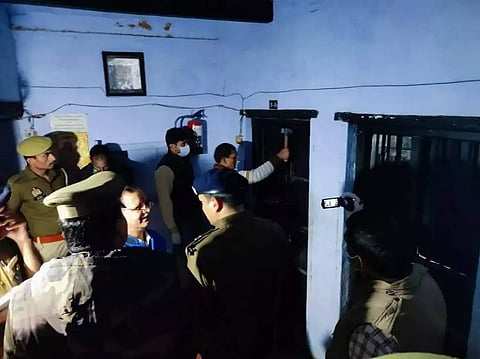
Varanasi- In a grim turn of events, a family of four from Andhra Pradesh ended their lives in a mass suicide inside a room at Kashi Kailash Bhawan Dharamshala in Varanasi. The victims were identified as Konda Babu (50), Lavanya (45), Rajesh (25), and Jayaraj (23). The shocking incident, believed to be triggered by a financial dispute, has sent shockwaves through the community. As authorities grapple with the aftermath, the haunting memories of the Burari incident resurface, prompting questions about the underlying factors that lead families down such harrowing paths.
In 2018, eleven members of the Chundawat family in Burari, Delhi, tragically died in what authorities deemed a ritual mass suicide. Ten individuals were discovered hanging, while the grandmother, the eldest family member, was strangled. The bodies were found on July 1, 2018, with the police attributing the deaths to a shared delusion or psychosis.
The family had checked into the Dharamshala on December 3, citing their visit for the Kashi Yatra pilgrimage. The room, allotted to them upon vacancy, became the setting for the tragic event. According to VB Sundar Shastri, Managing Trustee of Dharamshala, the family had settled the dues and informed the office that they would vacate the room on the morning of December 7.
The dreadful discovery was made when the Dharamshala staff, growing suspicious as the room remained closed till Thursday evening, alerted the police. Upon forcibly entering the room, the authorities were met with a horrifying scene – all four family members hanging from the ceiling with nylon ropes. The police promptly summoned forensic teams and a dog squad to investigate the circumstances surrounding the mass suicide.
Varanasi Police Commissioner Ashok Mutha Jain, who visited the site, revealed that a suicide note written in Telugu was recovered from the scene. The note detailed a financial dispute originating in Andhra Pradesh that had left the family in deep distress. The deceased individuals, including the parents and their two sons, had allegedly been facing financial troubles for the past two months.
The suicide note accused certain individuals in Andhra Pradesh, pointing to an ongoing dispute at their place of work. Commissioner Jain confirmed that a thorough investigation would be conducted, and appropriate legal action taken.
The tragic incident draws unsettling parallels with the infamous Burari incident in Delhi five years ago, where 11 members of a family took their lives. The family from Burari had practiced hanging for about six days leading up to the incident, highlighting the eerie premeditation behind the shocking event.
As the nation grapples with the aftermath of this devastating incident, questions linger about the mental health and financial pressures that might have driven the family to such a desperate act. Authorities are urging communities to remain vigilant and to report any signs of distress to prevent such heart-wrenching occurrences in the future.
Thirty-seven years ago, on March 19, 1986, in the village of Chil Gavhan, Yavatmal district, Maharashtra, a farmer named Sahebrao Karpe Patil faced immense hardship. He, along with his wife and four children, tragically ended their lives by consuming pesticide. The family had traveled from their remote village to Vinoba Bhave's Ashram in Pavanar, Wardha district. This deeply saddening incident marked the first recorded mass suicide by a farmer's family in Yavatmal, revealing the profound struggles faced by agricultural communities in India.
According to the recently released NCRB data, there were 150 cases of mass or family suicides in 2022 and in these, 325 persons lost their lives. Maximum such cases were reported in Tamil Nadu, followed by Rajasthan, Andhra Pradesh and Karnataka. In the case of mega cities, eight of them registered 19 such cases of mass and family suicides in which 46 persons took their lives.
Tragically, instances of suspected mass suicides have cast a sombre shadow over different regions of India, underlining a disturbing trend of family tragedies.
In Gujarat's Surat this year, on October 28, seven members, including three children below eight years old, were discovered dead in their residence. While six succumbed to the consumption of poisonous material, one was found hanging from a ceiling fan. A recovered suicide note hinted at financial issues, emphasizing the silent struggles families face.
In November 2022, in Rajasthan's Udaipur district, six members of a family were found dead in what authorities believed to be a mass suicide. The victims include a couple and their four children, with the father allegedly strangling his wife and three children before taking his own life by hanging. The devastating discovery, made by neighbours in Jhadoli village of Gogunda tehsil, left the community in shock.
Similarly, in Mhaisal village of Western Maharashtra, nine family members were found to have taken their own lives in June 2022. The motivations behind these tragic events remain complex, with financial woes being a recurring theme, raising concerns about the mental health and societal pressures impacting families across the country.
From a psychological perspective, the devastating trend of family suicides amid financial struggles in India highlights the profound impact of socio-economic stressors on individuals and familial dynamics. Financial distress, especially when prolonged and severe, can act as a catalyst for heightened emotional turmoil, despair, and a sense of helplessness. Families navigating economic hardships often grapple with feelings of shame, inadequacy, and an overwhelming burden of responsibility. These cumulative pressures may lead individuals to perceive suicide as a dire means of escape from seemingly insurmountable challenges.
Speaking to The Mooknayak, Dr Gaytri Tiwari, an expert in Family Relations says," Families are intricate ecosystems, and economic challenges can strain these bonds to the breaking point. It is imperative that we foster open dialogues, reduce the stigma surrounding financial difficulties, and prioritize mental health support to mitigate the profound impact on family dynamics. True resilience lies in our collective ability to empathize, uplift, and create a nurturing environment for families facing economic hardships."
You can also join our WhatsApp group to get premium and selected news of The Mooknayak on WhatsApp. Click here to join the WhatsApp group.